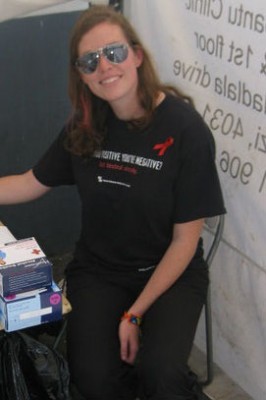
Mary Raffael while in South Africa. Photo courtesy Mary Raffael
If you ask students where they have traveled recently, their responses will probably include home or the beach. If you ask senior Mary Raffael where she’s been recently, she’ll tell you she made an 8,000-mile voyage last summer to South Africa.
Raffael, a global community health major, participated in the 2010 Building Bridges in South Africa program, designed to give students an opportunity to experience global health issues and culture within small townships.
“Prior to the trip I changed my major a couple of times and was unsure about what I wanted to do,” said Raffael. “I started volunteering with different HIV organizations in D.C. and it spiked my interest. [The trip] was a very spontaneous decision.”
As part of the BBSA Program, Raffael and her peers participated in various internships, immersing themselves in global health fieldwork.
“Half of our time was spent in class and half of our time was spent in the internships doing outreach on campus,” Raffael said. “I was the only one out of the group who had experience and training doing HIV testing, so I had to go alone a lot of the time.”
During her particular internship, Raffael spent much of her time doing public outreach and educating locals about HIV.
“South Africa starts [its] day early so I would have to be up at five or six in the morning,” Raffael said. “Two or three days of the week we would go restock condom dispensers, then do education for the community in rural townships along with do HIV testing and counseling.
“Sometimes it was relatively easy and sometimes it was relatively hard. There were days when I had a 50 percent positive rate. We had stations where we would draw the blood, do counseling, group education and the results. I was giving all the results. It was awful how many positives there were.”
Dealing with a positive HIV result was difficult for many of the people, but Raffael knew she was making an impact in their communities by helping them.
“Sometimes I was gone for 12 hours,” she said. “It would definitely take a toll on your energy, but it was totally worth it. The work that you do there makes it so much more powerful. We would come back at night and have a community dinner. We all kept daily journals which was a part of our assessment as well.”
Because of leftover racial prejudice from apartheid, Raffael faced apprehension from some members of the community.
“[During apartheid], many white people were rich and moved into cities, while many black people had to move out of cities into these shabby townships,” Raffael said. “There was still a little bit of mistrust [with the people I encountered] because I’m white. They’ve heard of white people putting HIV on their condoms so they don’t want to use them. It’s understandable, but there are still barriers to get through culturally.”
Another difficulty Raffael encountered was the language barrier.
“A lot of people do speak English, but South Africa has 10 to 15 different languages,” she said. “It’s hard because if people haven’t had any education we couldn’t communicate with them, and that was the at-risk population we were trying to reach.”
In certain townships, Raffael and her peers were able to stayed with local families to experience how they lived.
“One of the most impactful parts of the trip was when we stayed with some kids that we were partnered with [as part of a big sister/little sister program],” Raffael said. “My sister’s dad had died of HIV and her mom was positive and not doing very well.
They didn’t have any running water, appliances or electricity. It made a big impact, seeing how appreciative she was of everything and how happy she was. The things that we worry about at home seem so silly once you see that.”
Raffael has since applied for her master’s degree in social development at the University of Cape Town, and is hopeful she will return to South Africa within the next year.
“I look forward to volunteering again,” she said. “It opened my eyes to how important development is. You can read articles about it and see it on the news, but until you’re actually there it really doesn’t hit you.”






Comments